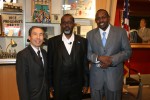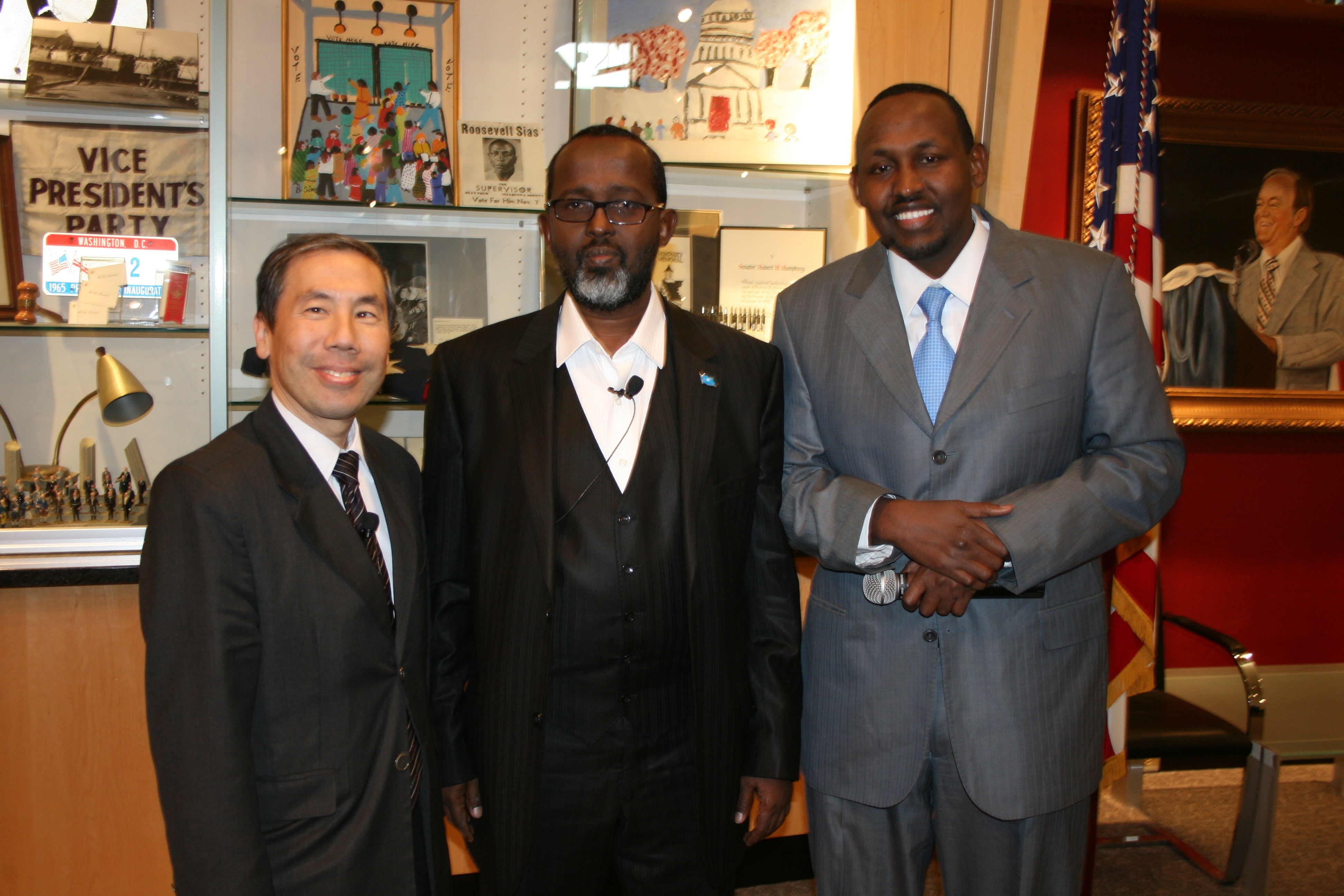
U.S. Department of State Bureau of African Affairs Secretary Donald Yamamoto said that the invasion of Ethiopian forces in 2006 in Somalia was a mistake. Yamamoto spoke at the Humphrey Institute of Public Affairs when he joined the Minister of Information for Somalia’s Transitional Federal Government (TFG), Dahir Gelle, to discuss foreign policy with the Somali community.
“We’ve made a lot of mistakes and Ethiopia’s entry in 2006 was not a really good idea,” said Yamamoto.
Gelle has been the Minister of Information for the TFG since 2009. He is a 44-year-old Somali media personality and holds a master’s degree in Islamic Shari’a law, political science and economics from Egypt’s prestigious University of Al-Azhar. Gelle spoke extensively on the overall progress made by the TFG and the challenges it has faced in the past and is currently facing.
Gelle said he is currently doing a stateside tour that includes Columbus, Ohio and Seattle. He said he is also meeting with U.S. officials in Washington D.C. to widen the support for Somalia. Gelle met with community leaders, women groups, youth and former members of the Somali military.
“I am here to visit with the Somali Diaspora and try to connect with the United States to discuss the challenges facing the Somali government and how we can enhance Somalia’s governing abilities,” said Gelle. “As the Minister of Information, I also wanted to discuss with the Obama Administration, especially the U.S. State Department, on how we could improve the relationship between Somalia and the United States.”
Yamamoto’s prior assignments include serving as U.S. ambassador to Ethiopia and Djibouti. He also served as deputy assistant secretary of state in the Bureau of African Affairs, where he was responsible for coordinating U.S. foreign policy to over 20 countries in East and Central Africa. He is a graduate of Columbia College and holds a master’s degree in International Affairs from Columbia University.
During the discussion at Cowles Auditorium, Gelle and Yamamoto said the discussions with the Somali Diaspora and the State Department have been a positive one. Gelle and Yamamoto engaged in a question and answer session with the audience about issues concerning the current Somali government and the role of the U.S.
Yamamoto emphasized that the Somali people need to work together and determine their own destiny. He said the U.S. wants to see the Somali people determining their own future and dictating the type of government and economy they want. He also said the U.S. is looking at and working with the TFG on ways to keep out unhelpful and destructive foreign influence as well as extremist ideology.
“Somali people are the ones who can solve their problems,” said Yamamoto. “There are so many outsiders involved in Somalia, but Somalis are the ones who should work together in unison and partnership. The U.S. stance is to give the capacity of need and also give the Somali people the opportunity to control their own destiny.”
Minister Gelle said the Somali Diaspora plays a vital role in the reestablishment of Somalia and stressed the importance of opposing radical thinking and extremism.
“The Somali people have been suffering and with Al-Shabab operating in the country, it has been hard to establish as a government, however, we have the plans to take actions so that the Somali people have the opportunity to live in a peaceful country,” said Gelle.
Yamamoto says he is very optimistic about the future of the Somali people and the Somali state. He says talking with and understanding the Somali Diaspora’s perspective will be helpful.
“We have to be very receptive, flexible and take opportunities and that’s why we are here in Minnesota,” said Yamamoto. “We really need to understand what is on the minds of the Somali community here because the people in Somalia are influenced just as much from the Somali Diaspora and vice versa.”
“The good news is that there is hope for Somalia because the people in Somalia are probably the most resilient people I have ever met,” said Yamamoto.
About Sahra Mohamud
Sahra Mohamud is a Mshale Staff Reporter based in Minneapolis. She is an alumni of the University of Minnesota School of Journalism and Mass Communications.
- Web |
- More Posts(10)





Of course it was a mistake. When 50,000 Ethiopians troops couldn’t beat 7,000 Somali Mujahadiins, it took the US Special Forces who were accompanying the Ethiopians and the US Air assault to change the balance of the battle to Ethiopians’ favor. But Secretary Yamamoto is not admitting that US is still embroiled in Somalia by supporting corrupt politicians and AMISOM forces who are daily shelling the defenseless civil population in Mogadishu whenever these forces come under attack from the opposition. So, it is not fair to lay all the blame on the Ethiopians only. There were many countries who were involved in that invasion. I think the Secretary is playing into concern of Somalis with respect to 2006 invasion while turning a blind eye on the war that is still continuing which the west is still funding.
Good Point Helen. Eritrea will pay it. Even now Again and Again will try another flop methods. It’s the Somali ppl pay the high prices. But they will as always have excuses to blame Eritrea SCAPEGOT. Americans have the UGLIEST history in the entire humanity(Way beyond Hitler) Japan (Hiroshima, Nagasaki), Vietnam, Ygoslavia, Cuba, Iraq and Iran, Iraq, Afghanistan, Somalia you name it. But thay manupulate the reality through their powerfull massmedia, Hollywood, Western allays and Popets to cover up and manupulate the History. If USA keep their hands away from other countries and UN unpartial Organasiation, the world would be the best place to live in.
Eritrea is not friend of somalia and Ethiopia. Eritrean government need to butt out od Somalia they are abusing their own people
Eritrea, all along, has said that the Ethiopian involvement, would result in a quagmire. Now, instead of acknowledging the ‘mistake, some of the perpetrators and thier unabashed supporters are engaged in the same old tired excuse of blaming and peanlizing the only party that had the integrity to tell it like it is. By doing so they are only exposing their contempt towards the intelligence of those familiar with the real story. Eritrea is a principled peace maker in the region that fell victim to the ulterior motives of those behind the chaos in Somalia.
Comments are closed.